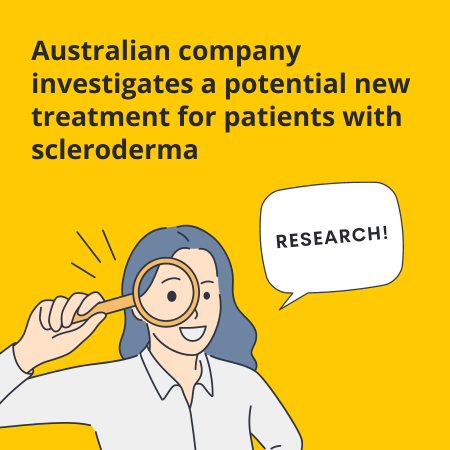
07 Jun Australian company investigates a potential new treatment for patients with scleroderma
By Dr Wendy Stevens
Asengeprast is an oral medication in development by Australian biotechnology company, Certa Therapeutics, for the treatment of diffuse scleroderma.
One of the hallmarks of scleroderma is increased collagen in the skin and other organs. This increased collagen leads to skin thickening, stiffness and scaring, termed fibrosis. The amount of skin thickening in scleroderma varies from person to person. Patients with limited
scleroderma often have a small amount of skin thickening on the hands and face whereas patients with diffuse scleroderma can have widespread skin thickening which can also lead to fibrosis within internal organs such as the lungs.
Previous treatments have focused on suppressing the immune system but there is a need for treatments that modify the development of fibrosis to slow down the amount of collagen the body produces.
Asengeprast, formerly known as FT011, acts by blocking a target on cells that cause the development of fibrosis. This target receptor, called GPR68, is inactive in healthy tissue, but is activated in tissues undergoing chronic damage, as occurs in scleroderma. Activation of
GPR68 then leads to inflammation and fibrosis in these tissues. Preclinical laboratory research from Certa Therapeutics shows that asengeprast slows down collagen deposition
and fibrosis by blocking GPR68 activation.

Initially Certa Therapeutics conducted a study in healthy volunteers that showed FT011 was safe. Since then, the team at Certa Therapeutics have conducted two clinical studies to determine if asengeprast is safe and has benefits in fibrotic conditions. One study was in participants with a fibrotic kidney condition and the second study (recently completed) was in participants with diffuse scleroderma (clinicalTrials.gov identifier: NCT04647890). The results of this study were presented at the 2023 Annual Scientific meeting of the American College of Rheumatology.
This was an international phase 2 study that involved 30 participants with diffuse scleroderma. Participants were divided into 3 groups and received either: placebo (no active treatment), 200 mg of asengeprast per day or 400 mg of asengeprast per day. Study treatment was given alongside participants immunosuppressive therapies. The participants were on the study treatment for 12 weeks.
Results from the study showed that 60% of the participants treated with asengeprast had improvement in measures of disease severity and organ damage (as measured by American College of Rheumatology Composite Response Index in Systemic Sclerosis – ACR-CRISS), compared to only 10% of those who received the placebo. Additional improvements were observed in lung function, overall health, and the ability to carry out daily activities. Additionally, study participants had a small punch skin biopsy at the start and end of the study which was used to look at the activity of the genes that regulate fibrotic pathways. This data showed modification in the fibrotic pathways in those participants taking 400 mg of asengeprast when compared to participants taking placebo. The study also showed that asengeprast was safe and well tolerated.

There were 2 sites in Australia that recruited participants for this study, St Vincents Melbourne and the Royal Adelaide Hospital. Participants in Australia continued taking asengeprast post this 12-week study for a total of 24 months, with results showing that treatment with asangeprast remained safe and well tolerated.
Whilst this small study has shown promising results, a larger and longer confirmatory study is required to confirm these findings. The Certa team is working closely with experts around the world to design the next study and is collaborating with Scleroderma Australia to ensure that information about future studies is readily available to those who are interested.


